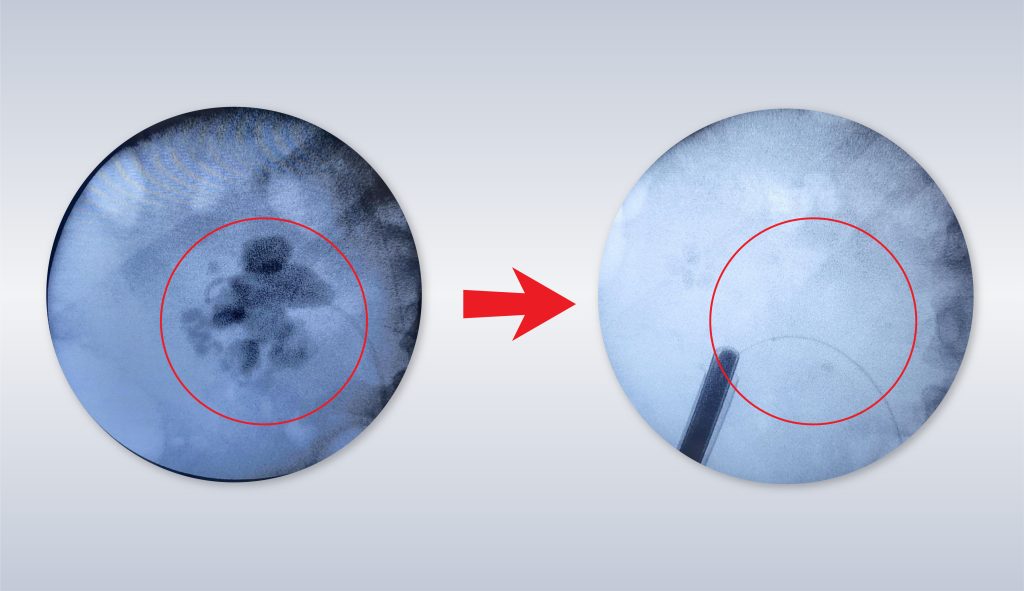By: Thalia Kaylyn Averil
Kidney stones are solid masses formed from substances found in urine. Urine has various kinds of waste dissolved in it. Crystallization occurs when there is a large amount of waste with a small amount of liquid. If the crystals cannot be excreted from the body with urine, they will continue to attract more waste and combine to form a larger mass. Once formed, the mass can remain in the kidney or pass through the urinary tract. Discomfort can occur when small stones pass through the urinary tract, but this discomfort does not always occur in all patients.
Kidney stones vary in size, from the size of a grain of sand to the size of a golf ball. The symptoms that arise will become more obvious as the size of the kidney stones increases. Common symptoms experienced by kidney stone patients are severe low back pain, persistent stomach pain, bloody urine, nausea, vomiting, fever, chills, cloudy or foul-smelling urine. Pain begins to occur if kidney stones cause irritation or blockage, this can progress very quickly, causing severe pain. However, kidney stones can also pass by themselves without causing any impact. Kidney stones can be caused by consuming foods that are either too high or too low in sugar and salt, exercising too frequently or infrequently, obesity, and family history.
Treatment for kidney stones in adults and children is the same. The doctor may ask the patient to drink lots of water or give medication to reduce the acidity of the patient’s urine. However, if the kidney stones are too large, block urine flow, or show signs of infection, the patient may be asked to undergo surgery. There are various approaches that can be taken to treat kidney stones, such as:
- Extracorporeal Shock Wave Lithotripsy (ESWL) is used for small kidney stones by using high energy waves to break the stones into smaller pieces.
- Ureteroscopy (URS) with Retrograde Intrarenal Surgery (RIRS) is effective for kidney stones that cannot be treated by ESWL.
- Percutaneous Nephrolithotomy (PCNL) is indicated for larger or more complex kidney stones.
Minimally invasive surgery has become popular in recent years, with an increasing number of procedures using advanced technology. Laser technology plays an important role in the treatment of urological diseases. Laser lithotripsy was first used by urologists using a Holmium:Yttrium-Aluminum-Garnet (Holmium:YAG) laser around 1980. Recently, interest in Thulium Fiber Laser (TFL) has increased. TFL offers advantages such as higher absorption in water-containing tissues and smaller fiber size.
Thulium Fiber Laser (TFL) is an advanced technology that offers several advantages compared to other traditional lasers for the treatment of kidney stones. TFL uses optical fibers containing thulium ions. If the thulium ions get energy, they will be excited and release protons, producing a laser. TFL can be used in various modes, such as quasi-continuous mode and SuperPulsed mode, which is useful in a wide variety of procedures in urological surgery. In the lithotripsy procedure, TFL can provide high energy to break down stones into smaller fragments. Lithotripsy uses a TFL in SuperPulsed mode by emitting pulse frequencies sequentially. SuperPulsed mode allows for precise treatment of kidney stones while minimizing damage to surrounding tissue. For kidney stone treatment, energy levels and frequency of TFL can be adjusted based on the size and location of the kidney stone.

Figure 1. Thulium Fiber Laser (TFL).
Compared with the Holmium:YAG laser, procedures using the Thulium Fiber Laser (TFL) show a shorter surgical duration, a higher success rate in completely clearing the stone, and a lower rate of kidney stone fragments re-entering the kidney or urinary tract. TFL has also been used successfully in patients under local anesthesia for bladder stones with minimal complications and excellent results. Therefore, TFL with its promising technology is one of the viable options for the treatment of kidney stones.
Abdi Waluyo Hospital provides the best health services with the latest technology in treating various health problems. Currently, Abdi Waluyo Hospital has the latest technology for treating kidney stones using Thulium Fiber Laser (TFL) operated by urologists. TFL allows more effective and minimally invasive treatment for patients with kidney stones. Apart from that, Abdi Waluyo Hospital also has a Holmium:YAG laser.
Resources
- World Health Organization. HIV and AIDS [Internet]. Geneva: World Health Organization; 2023 Jun 19 [cited 2024 Jul 7]. Available from: https://www.who.int/news-room/fact-sheets/detail/low-back-pain
- Choi CM. Biportal endoscopic spine surgery (BESS): considering merits and pitfalls. J Spine Surg. 2020 Jun;6(2):457-465. doi: 10.21037/jss.2019.09.29. PMID: 32656383; PMCID: PMC7340825. Available from: https://www.ncbi.nlm.nih.gov/pmc/articles/PMC7340825/
- Pérez EG, Santander XA, Llinás Amengual P, Choi DJ. Biportal Endoscopic Spine Surgery: Clinical Results for 163 Patients. World Neurosurg. 2023 Dec;180:e676-e685. doi: 10.1016/j.wneu.2023.10.007. Epub 2023 Oct 9. PMID: 37813335. Available from: https://pubmed.ncbi.nlm.nih.gov/37813335/
- The Spine Pro. Ultra-minimally invasive biportal endoscopic spine surgery [Internet]. California: The Spine Pro; date of publication unknown [cited 2024 Jul 7]. Available from: https://thespinepro.com/treatments/bess/
